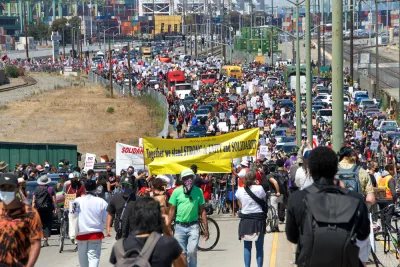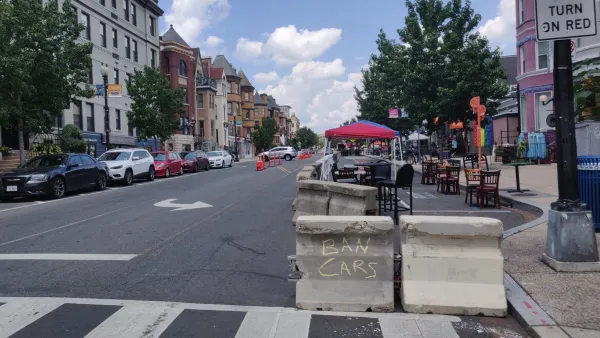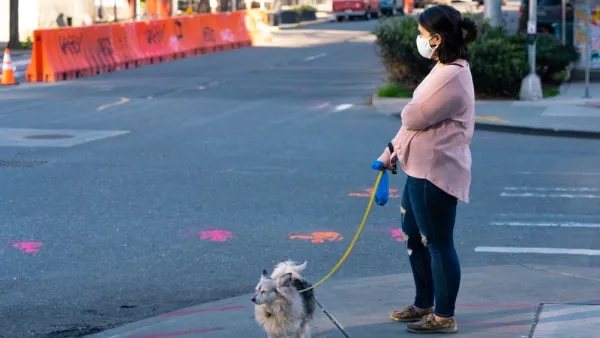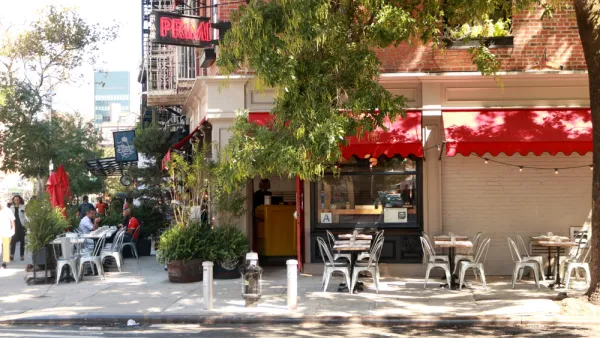The Oakland Slow Streets program, one of the most controversial developments of the early pandemic, has evolved to become the Essential Places initiative, thanks to new planning practices and a commitment to equity in Oakland, California.

Early pandemic, when stay-at-home orders were in place around much of the country and people leaving their cars in driveways in numbers not seen since the dawn of the automobile, the open streets movement began to gain transformative momentum as a way for weary residents to get out and safely exercise.
Oakland, California was one of the early leaders in the effort, announcing 74 miles of slow streets in April—weeks and even months before the idea would gain wide acceptance around the country. As the first, and with its history of gentrification and displacement, Oakland was also one of the first to hear criticisms that would become more vocal as the idea spread to other cities: that open streets and other programs suffered from a misunderstanding of equity and the realities of being people of color in public.
An article by Rikha Sharma Rani picks up the story in Oakland six months later to detail how planners have shifted their pandemic response to provide more equitable benefits. The article focuses on the city's deployment of the Essential Places initiative, launched in May "to reduce the threat to pedestrians in these high-injury corridors, many of them located in low-income communities of color," according to the article. "The initiative consists of an assortment of cones, barricades and signage strategically placed to slow or divert traffic."
Rikha Sharma Rani describes the Essential Places initiative as a replacement for the city's Open Streets program from April. The earlier program revealed a blindspot in the city’s planning, according to Rikha Sharma Rani: "At a time when urban planners are increasingly being called out for white elitism, Oakland is feeling its way, clumsily at times, down a different, more equitable path."
The transformation of the Slow Streets initiative into the more equitable Essential Places initiative involved weekly public meetings conducted by the city's Essential Places team, led by Warren Logan. The process of earning public trust during that process, and implementing the lessons gained along the way, is available in feature-length detail in the source article.
To be clear, the effort is framed as a success, and as a model for a more equitable approach to planning:
Perhaps not surprisingly, the pivot from slow streets to essential places in distressed neighborhoods, in direct response to the community’s feedback, has been generally well received. According to Department of Transportation data, there have been no collisions at designated Essential Places sites, even though all are part of the city’s high injury network where most collisions occur.
FULL STORY: How Oakland Got Real About Equitable Urban Planning

Analysis: Cybertruck Fatality Rate Far Exceeds That of Ford Pinto
The Tesla Cybertruck was recalled seven times last year.

National Parks Layoffs Will Cause Communities to Lose Billions
Thousands of essential park workers were laid off this week, just before the busy spring break season.

Retro-silient?: America’s First “Eco-burb,” The Woodlands Turns 50
A master-planned community north of Houston offers lessons on green infrastructure and resilient design, but falls short of its founder’s lofty affordability and walkability goals.

Test News Post 1
This is a summary

Analysis: Cybertruck Fatality Rate Far Exceeds That of Ford Pinto
The Tesla Cybertruck was recalled seven times last year.

Test News Headline 46
Test for the image on the front page.
Urban Design for Planners 1: Software Tools
This six-course series explores essential urban design concepts using open source software and equips planners with the tools they need to participate fully in the urban design process.
Planning for Universal Design
Learn the tools for implementing Universal Design in planning regulations.
EMC Planning Group, Inc.
Planetizen
Planetizen
Mpact (formerly Rail~Volution)
Great Falls Development Authority, Inc.
HUDs Office of Policy Development and Research
NYU Wagner Graduate School of Public Service




























